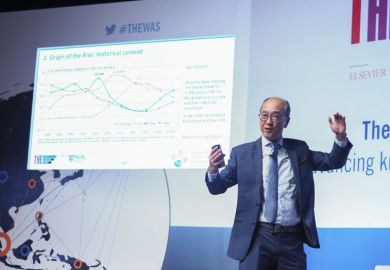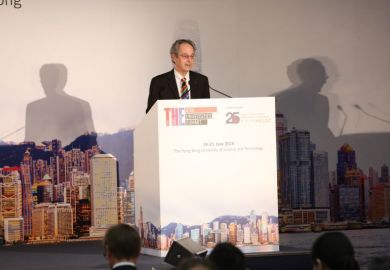Universities should consider remodelling courses around global development challenges rather than disciplines, the president of a leading Saudi university has suggested.
Speaking at Times Higher Education’s Global Sustainable Development Congress, Tony Chan, who has led King Abdullah University of Science and Technology (KAUST) since 2018, said higher education institutions should be ready to tear up traditional discipline-led teaching and offer more interdisciplinary courses based around Sustainable Development Goals (SDGs), such as sustainable cities, clean water and sanitation and marine conservation.
“When I was younger students would say, ‘I want to study mathematics or science.’ Today students are much more interested in studying sustainability, and are much more motivated by SDGs,” said Professor Chan, a former California Institute of Technology professor who led Hong Kong University of Science and Technology for nine years.
These courses could include “some economics, some science and some mathematics”, explained Professor Chan at the event at the University of Glasgow. He urged universities to “have interdisciplinary courses in these areas ready” for students given the changing interests of potential undergraduates.
Speaking to THE after the talk, Professor Chan said that this type of curricular change reflected the set-up of his own graduate-only university, which is organised around research themes, such as clean water or green energy, rather than disciplines.
“We have a lot of chemists but no chemistry department,” he explained, adding that these chemists might be working on ways to improve water desalination. “Not everyone has the luxury of doing away with departments so they can work in this way,” he added of his institution, which was founded 13 years ago with a $20 billion (£17.4 billion) endowment.
Professor Chan also defended the situation faced by women in Saudi Arabia, and pointed to KAUST’s own record on gender equality – one of the United Nations’ 17 SDGs – as a reason to be optimistic. Forty per cent of its students are women, of whom two-thirds are PhD candidates, he said.
“Anywhere in the world it is difficult to attract women students in STEM subjects,” said Professor Chan, who described the proportion of female graduate students at KAUST as “quite amazing”.
“Finding female faculty is more challenging – the problem isn’t culture as everyone wants to do it. But we don’t want to people to say a female faculty member was hired because she was female – it has to be on academic quality,” he added. Professor Chan said he was, however, delighted to hire a Saudi-born female researcher who had taken her PhD at Imperial College London before moving to Caltech. “She could really write her own ticket, and I hope she will be an inspiration to others,” he said.
Reflecting on the relatively recent gender shift within science, Professor Chan, who is 70 years old, said: “When I graduated from Caltech [in the 1970s], I did so with the very first women to go there – so, even in my lifetime there has been huge change. These things can take time.”
Register to continue
Why register?
- Registration is free and only takes a moment
- Once registered, you can read 3 articles a month
- Sign up for our newsletter
Subscribe
Or subscribe for unlimited access to:
- Unlimited access to news, views, insights & reviews
- Digital editions
- Digital access to THE’s university and college rankings analysis
Already registered or a current subscriber?










